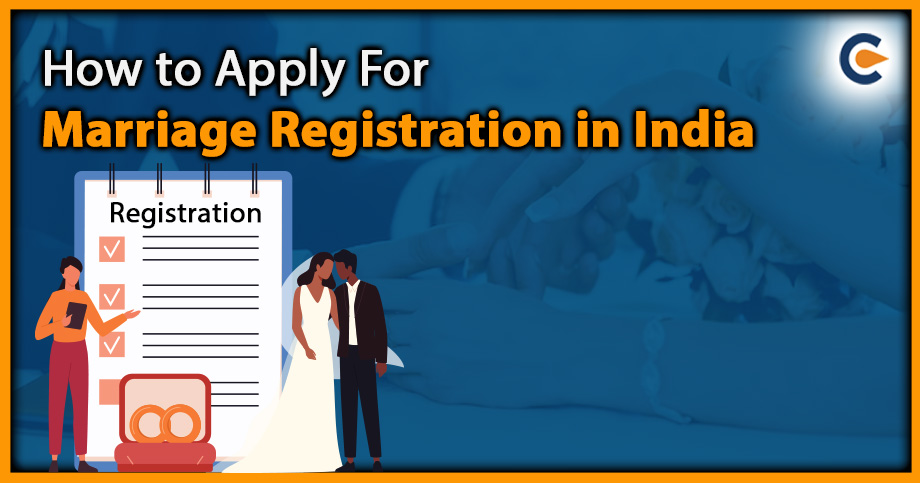The bond of marriage is considered as a sacred relationship in India. When a child is born in an Indian family, preparation for its future is started by itself. And when we talk about their future, we mean their career and marriage. The relationship of marriage is considered as a relationship which ends with death in India. It is even considered as a relationship between the next seven births. People in India go beyond making sure that their family’s weddings are fully cherished. Giving a legal status to marriage is as important as planning and having fun in marriage, but most people fail to do so. A couple can legalize their marriage through the process of registration of their marriage. The Marriage registration provides a certificate known as Marriage Certificate. Marriage certificate is a legal Document provides legal status to marriage and security to the both individuals. A marriage certificate, which will only be issued if your relationship is legally recognized, is necessary for all future joint ventures, including applying for a spouse visa if you decided to travel abroad or purchasing real estate in the country.
A marriage certificate is also required in some mishappening between the partners of a marriage, like it is needed for separation if things do not work out and one is considering it. Also, a certificate is needed for claiming an insurance claim in the event that any of the partners passes away. That’s why Registration of Marriage can be considered as the most important and wise step.
What is Marriage Registration?
In 2006, the Apex Court of India made registration of marriage to be compulsory and to get certificate for same. The certificate of Marriage is a legal document having binding force to the marriage. The process of Registration of Marriage is governed by The Hindu Marriage Act, 1955 and The Special Marriage Act, 1954[1]. In India, a person can get register his marriage either under The Hindu Marriage Act, 1955 or under The Special Marriage Act, 1954.
While getting your marriage registered is extremely important, most people face struggle with the procedure due to lack of expertise and experience. Not even to worry. We are here to assist. In India, two methods are provided for registering a marriage: one is Online and another is Offline. Below, we have included a detailed explanation of both processes.
Online Method to Apply For Registration of Marriage
Growing technology has made the world better. In India, like many other important things are available online on the internet just like marriage registration is also available online. After the covid-19 era, online registration is one of the most suitable and efficient method. It helps us to avoid the lengthy processes of government offices and long queues as Great Wall of China, most importantly it saves time.
The steps to be followed for online registration of the marriage are:
- Step 1 –Visit the official website of State Government at http://services.india.gov.in/service/, State from the applicant belongs to.
- Step 2 – Find the appropriate form for the marriage registration by browsing the website.
- Step 3 – Fill all the asked information and personal details about you and your spouse.
- Step 4 – Submit the application form after checking all the provided details are correct.
After the successful submission of the form, the applicant along with his partner need to be present before the Registrar of Marriage on the provided date and time by the registrar. Once the registrar summons the applicant for the appearance in his office, then it is mandatory for the applicant to be present with all the required documents and required witnesses.
Offline Procedure to Apply For Registration of Marriage
As we discussed above, In India the marriage should be register either under The Hindu Marriage Act 1955, which governs marriages of Hindus or The Special Marriage Act 1954, which governs all other citizens irrespective of their religion.
According to the Hindu Marriage Act 1955
In order to register for a marriage under the Hindu Marriage Act 1955, both the partners must be Hindu, Sikh, Jain or Buddhist. In this context, you can apply to register for a marriage that has already been solemnized. You must submit your application at the office of the Sub-registrar in whose jurisdiction the marriage was solemnized or where one of the partners has lived for at least 6 months. Hindu marriages can be celebrated in accordance with either party’s traditions or customs.
According to the Special Marriage Act 1954
It is possible for people from two different religious backgrounds to come together in a marriage under the Special Marriage Act 1954. The Special Marriage Act, unlike personal laws, is applicable to all Indian citizens, regardless of their religion. The Special Marriage Act allows for both solemnization and legal registration, even though the Special Marriage Act only permits the registration of a marriage that has already been solemnized under private laws. The Special Marriage Act was created to provide a straightforward method of legally registering a marriage between two persons of different religions, but even if both couples belong to the same religion, they may opt to do so. The Special Marriage Act is provided with the following step by step procedure.
Step 1 – Both the intending parties must passed through Eligibility Check
Step 2 – Approach to the concerned Marriage Registrar
Step 3 – Issuance of Public Notice and Objection.
Step 4 – Final Registration.
Conclusion
India is a country full of diversity in religion, language and concepts. In a similar way, customs are different for different regions and religions. The process of registration for marriage is really lengthy and time-taking but we are here for you to make the process easier for you.
Also Read:
What Is The Process Of Registering Marriage In Delhi Under Hindu Marriage Act?











